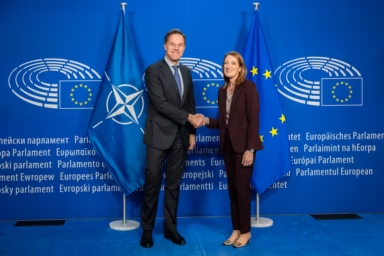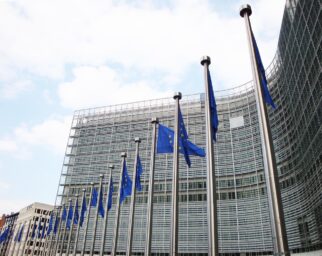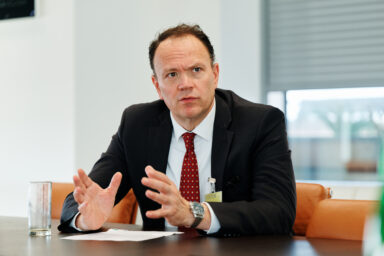As the European Commission unveiled its proposal for the new Multiannual Financial Framework on Wednesday, two key priorities emerged: defence and competitiveness. Of the nearly €2tn budget, at least €131bn will go to defence and space programmes.
The defence and space budget lines will be grouped within a newly created funding category labeled the ‘Resilience and Security, Defence Industry and Space’ package. Under the previous 2018 budget framework, €10bn (or €12.5bn inflation-adjusted) was earmarked for defence industry initiatives, though this figure excluded space-related expenditures. The current proposal integrates the European Defence Industry Programme (EDIP) and the European Defence Fund (EDF) into a broader €451bn European Competitiveness Fund (ECF). This consolidated structure merges up to 14 existing budget lines.
The ECF’s design aims to enhance the Commission’s ability to reallocate resources fluidly across strategic areas. While policymakers and industry leaders have previously advocated for a €100bn threshold for EU defence industry investments, the Commission’s current proposal exceeds this benchmark.
Speed and connectivity matter
“Our Union must be able to defend itself, stay connected, and act swiftly whenever needed,” the Commission stated during the presentation. To support this goal, it has proposed the creation of a single European competitiveness fund, aimed at investing in strategic technologies, in line with the recommendations from the Letta and Draghi reports.
The Fund will streamline access to EU financing through a single regulation and point of entry and will focus its support on four key areas such as green transition and decarbonisation; digital transformation; health, biotechnology, agriculture, and bioeconomy; defence and space.
Defence and space get €131 Billion
The defence and space component alone will receive €131 billion, marking a fivefold increase compared to the previous MFF. “Security is one of the main concerns of both citizens and governments,” said Commission President Ursula von der Leyen, emphasizing the aim to strengthen Europe’s industrial base and collective capabilities.
Member states and regions will be able to participate voluntarily, based on their national and regional priorities. The Connecting Europe Facility (CEF) will also see its military mobility budget increased tenfold, supporting dual-use infrastructure projects alongside civilian ones. Investments will also target cybersecurity, infrastructure resilience, and overall defence development. Cross-border projects in energy and transport will contribute to improving Europe’s energy security.
You might be interested
Divided into three chapters, the CEF seeks to support investments in cross-border energy and transport infrastructure projects, both new and existing. Meanwhile, the digital portion operates under the European Health and Digital Executive Agency.
Migration, internal security take €34 Billion
The new budget also triples funding for migration management and border control, allocating €34 billion to reinforce the EU’s external borders and internal security. “Borders are a shared responsibility,” the Commission President stressed, outlining a coordinated approach to emerging challenges.
The funds will enable member states to respond more quickly and effectively on the ground, strengthen online and offline law enforcement capabilities, equip border guards with the necessary tools, and implement a fair and robust migration management system, aligned with the EU Pact on Migration and Asylum.
Borders are a shared responsibility. – Ursula von der Leyen, President of the European Commission
However, the European Commission’s proposal for the next MFF signals a significant shift toward a more strategic, values-driven, and impactful approach to external relations, with reinforced support for EU enlargement, global partnerships, and diplomacy. In fact, the Global Europe Instrument, a streamlined funding tool worth €200bn, designed to enhance the effectiveness and visibility of EU external action in partner countries. The instrument aims to simplify financing mechanisms and maximise impact on the ground, with €15bn set aside as a dedicated reserve to respond swiftly to crises and unforeseen global developments.
Kiev ends up with ‘flexible’ €100bn
The EU keep supporting Kiev with up to €100bn earmarked over the seven-year period. Given the scale and unpredictability of the conflict, this funding will include flexible mechanisms to adapt to changing needs – military-related operations will remain under the purview of the European Peace Facility.
Additionally, the EU plans to allocate €3.4bn to support actions under the Common Foreign and Security Policy (CFSP), reinforcing the Union’s commitment to peace, international security, human rights, and democratic governance across the globe.
At The EU Parliament, European Commissioner Piotr Serafin has announced a major reinforcement of the Connecting Europe Facility programme, with a total budget of €81 billion planned for the 2028-2034 period. This substantial investment aims to complete and modernise Europe’s essential infrastructure, ensuring that Europe remains connected, efficient, and secure, with a particular focus on sustainable cross-border projects and military mobility.
According to the European Parliament’s ruling coalition, the areas of defence and competitiveness seem to be gaining ground at the expense of traditional priorities, such as cohesion and agriculture. Some MEPs did not like it; MEP Siegfried Mureșan (EPP/ROU), rapporteur on the long-term budget, raised the concerns on their behalf.











